To read the earlier articles in this series by Lisa please click on the links below
Part 1 – Sports Migration during National Socialism: Reasons and Research on the Emigration of Jewish Athletes from Germany after 1933 – Click HERE to read
Part 2 – Daniel Prenn ~ Emigrations in the Life of an International Tennis Star: From Germany’s Celebrated Number One to Eviction Within a Year – Click HERE to read
Part 3 – Gretel Bergmann ~An International Olympic Contender: The ‘Bitter Awakening from the Wonderful Dream’ of Attending the Olympic Game – Click HERE to read
The cruel segregation of German sports in 1933 was the beginning an odyssey through Europe for Martha Jacob. The young sportswoman’s and physical education teacher’s search from employment and security led her through several countries after leaving Germany.
Martha, also known as Martel, Jacob was born in Berlin on the 7th of February 1911. Martha’s parents both died within a year of her birth and she grew up with the family of her mother in the German capital.
Here, she became a member of the country’s oldest Jewish club, Bar Kochba Berlin, at the age of 6. Later she was also a member of the Berlin Sports Club, before transferring to the Sport-Club Charlottenburg in 1928, which had an own women’s sport section. Nonetheless, Martha always remained a member at Bar Kochba and even competed at tournaments for the club.
While pursuing a successful sports career, Martha began studying at the College for Physical Education in Berlin, where she wanted to graduate as a physical education teacher.
Soon after she began her studies, Martha achieved her first major sportive success with a first place in the javelin throw at the regional championship of Brandenburg:
“When I went to the Sport-Club Charlottenburg earlier this year, I never dreamed of becoming Berlin’s champion. I actually preferred the shot put. I threw the javelin on the side. […] I was defeated in the shot put, but I became champion in javelin throwing and will now go to Frankfurt. And from the day of the championship I exclusively started to practice the javelin.”[1]
At the German championship in Frankfurt, without being a favourite, Martha was victorious once more and won her first national title. This led to her being second in the German javelin ranking and fifth worldwide.
Subsequently, she was invited by the national athletics team to participate in an international track and field meeting with Great Britain. Here she was able to achieve the second place, but more importantly impressed the British athletes with her talent. She was asked to come to England in 1931 and prepare the British athletics team for the Olympic Games in Los Angeles the following year. With this, Martha became the British Women’s Athletic Association’s first coach from abroad.
Martel pictured while coaching the British athletes and being filmed by representatives of the media.
In England “famous German athlete Fraulein Martel Jacobs” became a ‘darling’ of the media.[2] Besides reports about her coaching, many newspapers printed pictures of her and she was filmed during training occasions. Likewise, her friendships with famous British athletes were often thematised. A picture in the Sheffield Daily Telegraph shows her with fellow athlete “Mrs. Muriel Cornell, the English long jump champion” doing hurdles.[3] The two women developed a good friendship over their love for sport, including the playing of “several strenuous sets of lawn tennis”.[4]
After her coaching engagement, Martha returned to Germany and focused on her own career again. She finished her studies at the College for Physical Education with a thesis on “Organizational Matters and Methods of Women’s Athletics”. Yet, her coaching in England was not the last occasion a job led Martha to the United Kingdom.
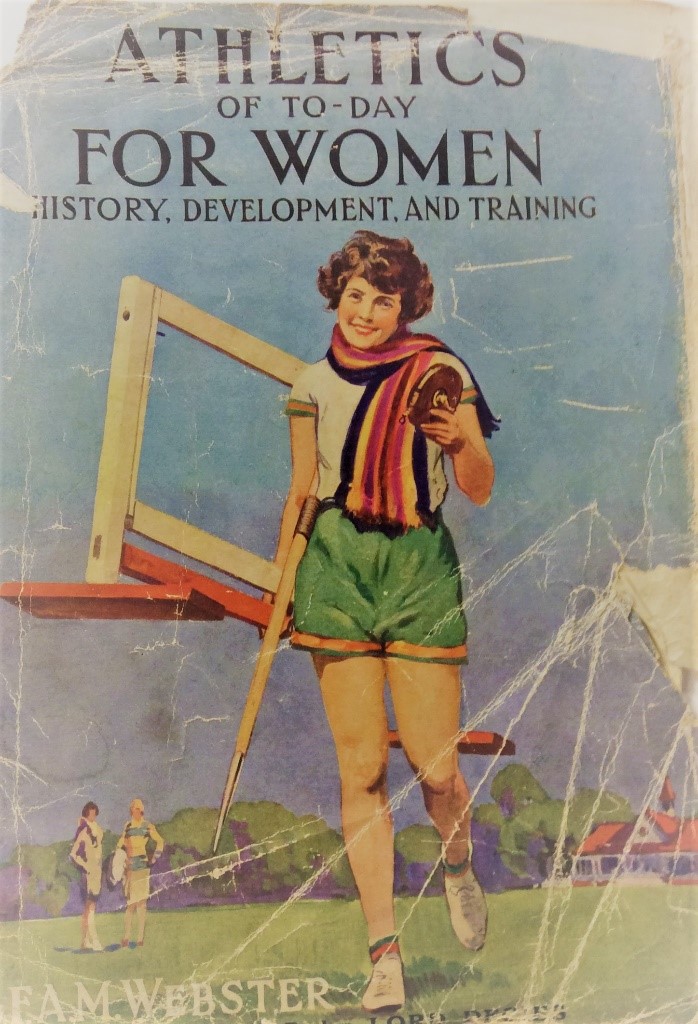
Dust cover for the book “Athletics of To-day for Women” by F.A.M. Webster, London, 1930.
Source: Jüdisches Museum Berlin: 2016/411, Collection Martha Jacob, Donation Sandra Shore Goldfarb
After the segregation of German sport in April 1933, Martha shared the fate of her fellow Jewish athletes. She was excluded from the Sport-Club Charlottenburg and her sportive as well as occupational prospects were obstructed. Martha faced an uncertain future and lack of opportunities in Nazi Germany. She had to make a considerable decision regarding the next steps when her family brought up the idea of going to England. A friend of her recalls Martha’s certainty of a promising future in the country:
“she was a known athlete and it wouldn’t be a problem to get a job in England.”[5]
Being able to work in her field was a main rationale for her migration to the UK. This determination to work specifically as a physical education instructor is repeatedly observable throughout the odyssey that would become her life after 1933. According to another friend, Martha also intended to pursue a second plan in England, namely the establishment of a “sports school”. Through her previous experiences as a coach in the country and her studies, she certainly had a degree of expertise that made the UK a rational and obvious destination for migration. Moreover, she spoke the language very well.
After her immigration Martha lived in London. Here she became a member of the Middlesex Ladies’ Athletic Club, a club she had already been to while training the athletes during her coaching employment. She was part of the Middlesex team for several competitions, one in May 1933 against two other London women’s teams. At this tournament Martha won the shot put and set a new British record in the discipline.
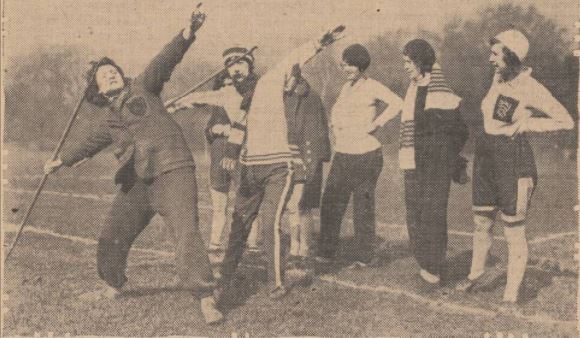
Throwing the Javelin
Martel Jacob[bareheaded], the Berlin school girl, who holds the German javelin-throwing record, giving instruction in javelin-throwing to British girl athletes in Battersea Park
Source: Daily Mirror Monday 09 March 1931
Another affiliation of hers, staying loyal to her former associations, was the British Maccabi movement. In August 1933, she represented Britain at the international Maccabiah, the Jewish Olympics, in Prague. At this occasion, she was the only woman among 23 athletes selected. One of her teammates was fellow German-Jewish immigrant Daniel Prenn. This selection of two foreign contenders to the team is notable, it underlines the two athletes’ outstanding sportive reputation in their respective disciplines. However, it also represent the relatively low enthusiasm and commitment for Zionist sports among the British Jewry:
“The British team attracted a good deal of attention, because it included Daniel Prenn, the German tennis champion, who was barred from German teams by the Nazis because he is a Jew. Another notable British competitor was Miss Martel Jacob, the only lady member of the team. Miss Jacob came to England last April and joined the London Maccabi. She was elected to represent Great Britain at the Olympiad because, in spite of appeals, no British Jewess came forward. Miss Jacob left Germany because of the Nazi rule”[6]
While achieving several sportive accomplishments, Martha’s attempts regarding her career as a sports instructor remained largely unsuccessful. This was due to her being unable to acquire a work permit or establish a sport school in the UK.
A large part of the contemporary British immigration policies were directed towards securing occupation for Britons following the economic crisis of the early 30s by preventing migrants from competing at the job market. Therefore, people, upon arriving in the country, were often prohibited from taking employment and applications for work permits were seldom granted. Objections towards allowing Jewish immigrants to take work were further reinforced by a fear of increasing anti-Semitism.
Despite the fact that Martha was again able to compete on a high level in sports and was seemingly well integrated into her sportive as well as Jewish environment in the UK, the separation from her family, no employment and the situation as a migrant were major influences on her state of mind during the period away from home and the familiar surroundings. A friend of Martha recalls her feelings at the time:
“Martel, you know, couldn’t be alone – not for a moment. And after she left Germany, she was very lonely and felt very much alone.”[7]
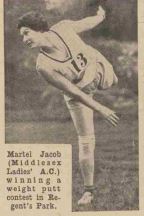
Source: Daily Mirror Monday 15 May 1933
After having been unable to obtain a British work permit or establish her own sports schools, in 1934 Martha decided to migrate further and to attempt a career in her field in France.
After late April 1934, several articles about Martha were published in French newspapers, one about an interview with in the magazine Match – predecessor of today’s Paris Match. Another article advertised a new sports centre that was being built and scheduled to open soon. The “Grand Centre d‘ Education physique” was to focus on the physical education of the youth and planned as the first sports facility in Paris open to everyone. The reporting mentions that Martha was expected to be in charge of sports lessons for women and children. According to sport historian Berno Bahro, she was also in discussion for the job as coach to the French track and field athletes who trained for the 1936 Olympic Games. However, as the officials learned of Martha’s Jewish background both a work permit and the job were denied.[8]
This situation led to Martha leaving France for the Netherlands where she did not need a permit to obtain employment. However, before arriving in the country, she participated at the Maccabiah in Tel Aviv in April 1935, this time for the German team. Here she finished second in both discus and javelin throw, demonstrating that even as an ‘uprooted’ refugee in Europe she was still able to train and successfully compete in her disciplines. In July of that year, she also shortly returned to Germany to compete in a tournament between Jewish sports federations. Martha won both the shot put and the discus throw and came second in javelin. During this trip, she briefly visited her family in Berlin and was unexpectedly summoned by the Gestapo. The Nazis wanted information from Martha about her connections to the British Maccabi organisation and its officials, therefore, interrogating her unsuccessfully for hours.
After this experience, Martha decided to leave not only Germany but Europe immediately. She chose South Africa as her designated destination, as the chances for a residence permit in the country were high. After moving to Johannesburg, she married her fiancé Leo Kerz whom she had met in the Netherlands and she started working as an instructor for gymnastics lessons as well as a masseuse at her home. Martha was also able to continue her constant sportive successes, winning the 1937 South African Athletics Championship in javelin.
In 1940, after having divorced her husband, she moved to Cape Town where she eventually ended her sportive career after many achievements including different national and international titles. Here she also remarried. With Barney Shore she had two daughters. The younger one, Hazel, extensively studied her mothers’ life while campaigning to reinstate her story into collective (sport) memory in Germany and achieve the recognition Martha deserved. A few years ago, a square in Berlin was renamed Martha-Jacob-Platz after the successful Jewish sportswoman and coach.
Martha Jacob died on the 13th of September 1976 in South Africa.
Article © of Lisa Jenkel
References
[1] Newspaper Article ‘Wir lieben den Kampf im Sport‘, June 1929, Schenkung Hazel L. Shore, Jüdisches Museum Berlin, Berlin, Germany. [translated L.J.]
[2] Norwood News, Friday 01 May 1931, page 12 – “Champion Javelin Thrower in Streatham.”
[3] Sheffield Daily Telegraph, Wednesday 01 April 1931, page 10 – “Splendid Girls Athletes.”
[4] Daily Herald, Friday 10 April 1931, page 12 – “The Sports Girl.”
[5] Transcript of Hazel Shore’s Interview with Marion Gerver, February 1985, 2014/11 (uncatalogued), Schenkung Hazel L. Shore, Jüdisches Museum Berlin, Berlin, Germany.
[6] The Jewish Chronicle, Friday 01 September 1933, page (?) – “The Jewish Olympiad”.
[7] Transcript of Hazel Shore’s Interview with Sepp/Zepp Fuss, April 1985, 2014/11 (uncatalogued), Schenkung Hazel L. Shore, Jüdisches Museum Berlin, Berlin, Germany.
[8] Berno Bahro, “Lilli Henoch and Martha Jacob – Two Jewish Athletes in Germany Before and After 1933,” Sport in History 30, no.2 (2010): 281.

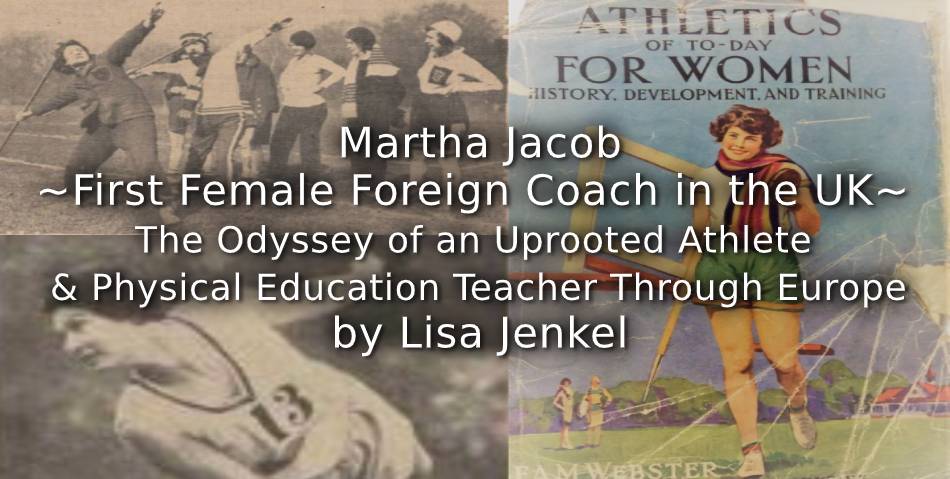
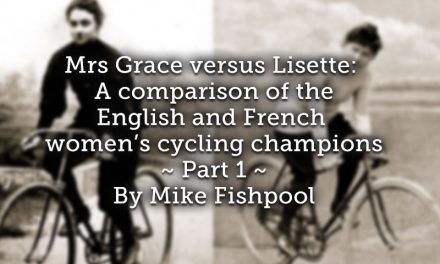
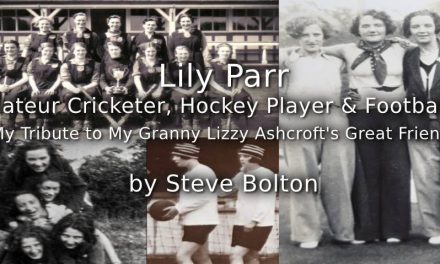
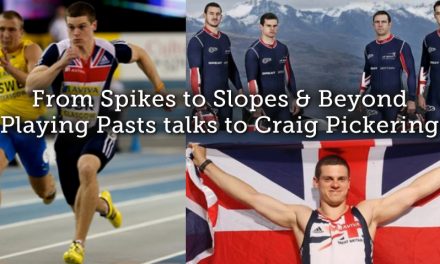

For Lisa Jenkel: Could you contact me please. I would be eager to get copies of a the several articles in French papers or magazines you cite. Ditto the Sheffield newspaper clip. My email contact: hlshore@earthlink.net.
I am currently writing a biography of my mother that includes the long struggle to resuscitate to the annals of sports history in Germany the lives and achievements of pre=war 2 Jewish athletes. It will document the struggle of what was involved in getting the SCC to admit after 73 years its Nazi complicity.